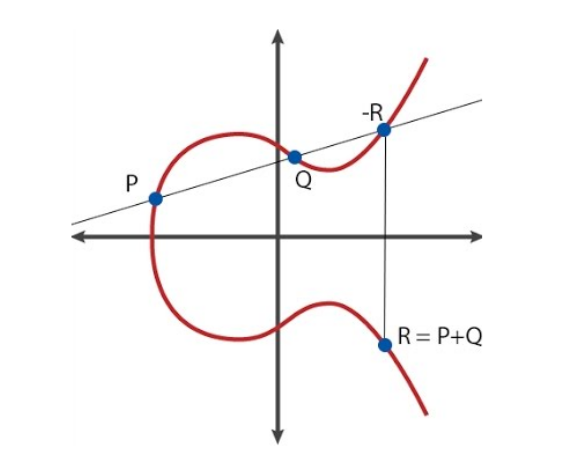Elliptic Curve Cryptography
Elliptic Curve
Assume a field $\Bbb{K}$, and the field’s characteristic, $char(\Bbb{K}) \neq 2,3$, then an Elliptic Curve over the field can be described as the equation:
$E(x, y): y^2 = x^3 + ax + b$
There is a singular point $P(x_p, y_p)$, if $$ \begin{align*} \frac{dE(x_p, y_p)}{dx} &= 3x_p^2 + a = 0 & \implies x_p & = (\frac{-a}{3})^{1/2} \newline \frac{dE(x_p, y_p)}{dy} &= 2y_p = 0 & \implies y_p & = 0 \newline \end{align*} $$ And substitute in $E(x,y)$ $$ \begin{align*} 0 &= (\frac{-a}{3})^{3/2} + a(\frac{-a}{3})^{1/2} + b \newline (-b)^2 &= ((\frac{-a}{3})^{3/2} + a(\frac{-a}{3})^{1/2})^2 \newline b^2 &= (\frac{-a}{3})^{3} + a^2(\frac{-a}{3}) + 2(\frac{-a}{3})^{3/2}a(\frac{-a}{3})^{1/2} \newline b^2 &= \frac{-a^3}{27} - \frac{a^3}{3} + \frac{2a^3}{9} = \frac{-4a^3}{27} \newline 27b^2 &= -4a^3 \newline 0 &= 4a^3 + 27b^2 \end{align*} $$
Such that if $4a^3+27b^2 \neq 0$ then the curve $E(x,y)$ is no-singular.
At last, here is the definition of elliptic curve: $$ {(x,y) \in \Bbb{K} \mid y^2 = x^3 + ax + b, 4a^3+27b^2 \neq 0} \cup { \mathcal{O} } \text{ if } char(\Bbb{K}) \neq 2,3 $$ with $\mathcal{O}$ the point at $\infty$. A group over elliptic curves can be defined as below:
- the elements of the group are the points of an elliptic curve
- the identity element is the point $\mathcal{O}$
- the inverse of a point P is the one symmetric about the x-axis
- addition: given 3 aligned, non-zero points P, Q and R, their sum P+Q+R=0
Addition
Given 3 aligned, non-zero points P, Q and R, their sum P+Q+R=0

- Elliptic curve (E): $y^2 = x^3 + ax + b$
- Line (L): $y=mx+n$
The intersection points of (E) and (L) are the solutions to the equation below: $$ \begin{align*} (mx+n)^2 &= x^3 + ax + b \newline m^2x^2 + 2mnx + n^2 &= x^3 + ax + b \newline 0 &= x^3 - m^2x^2 + (a-2mn)x + (b-n^2) \end{align*} $$ According to Vieta’s Formulas $$ x_P + x_Q + x_R = -(-m^2) / 1 = m^2 $$
Assume 2 intersection points P, Q are already known, then the third intersection point -R, $P(x_R, -y_R)$,
$$ \begin{align*} x_R &= m^2 - x_P - x_Q \newline -y_R - y_P &= m(x_R - x_P) \newline \end{align*} $$
So the point R, $P(x_R, y_R)$: $$ \begin{align*} x_R &= m^2 - x_P - x_Q \newline y_R &= -m(x_R - x_P) - y_P \end{align*} $$ If $x_P \neq x_Q$, $$m=\frac{y_P - y_Q}{x_P - x_Q}$$ If $x_P = x_Q$ $$ \begin{align*} \frac{dy^2}{dx} &= \frac{d}{dx}(x^3+ax+b) \newline 2y\frac{dy}{dx} &= 3x^2 + a \newline \frac{dy}{dx} &= \frac{3x^2 + a}{2y} \newline & \implies \newline m & = \frac{3x_P^2+a}{2y_p} \end{align*} $$
Multiplication
$nP = P + P + … + P$
Elliptic Curves over finite fields
In cryptography the finite field is usually a set of integers modulo $p$, where $p$ is a prime number. It is denoted as $GF(p)$ or $\Bbb{F}_p$, and $char(\Bbb{F}_p) = p$. Then an elliptic curve can be defined as: $$ { (x,y) \in \Bbb{F}_p^2 \mid y^2 \equiv x^3 + ax + b \mod p, 4a^3 + 27b^2 \not\equiv 0 \mod 0 } \cup \mathcal{O} $$ where $\mathcal{O}$ is still the point at $\infty$, $a$ and $b$ are two integers in $\Bbb{F}_p$, and $char(\Bbb{F}_p)=p \neq 2,3$